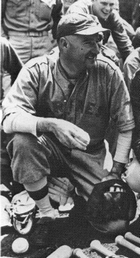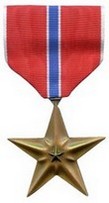Jim Bivin
Ballplayers Wounded in Combat
| Date and Place of Birth: | December 11, 1909 Jackson, MS |
| Date and Place of Death: | November 7, 1982 Pueblo, CO |
| Baseball Experience: | Major League |
| Position: | Pitcher |
| Rank: | Private First-Class |
| Military Unit: | Quartermaster Company, 2nd Marine Division US Marine Corps |
| Area Served: | Pacific Theater of Operations |
James N. “Jim” Bivin, Jr., The son of James and Frances Bivin, was born
in Jackson, Mississippi, on December 11, 1909. He attended Yazoo County
Agricultural High School in Benton, Mississippi, and pitched for local
teams, before signing with the Davenport Blue Sox of the Class D
Mississippi Valley League for the 1930 season. The 6-foot, right-hander
posted a respectable 12-10 record in 26 games, and advanced to the
Wichita Aviators of the Class A Western League for 1931, where he was
14-9 in 37 appearances.
Bivin joined the Tulsa Oilers of the same league in 1932, and was 15-7,
followed by an 11-13 record for the Oilers (who were now in the Class A
Texas League) in 1933. In 1934, Bivin joined the Texas League's
Galveston Bucaneers and had an outstanding season with the league
champs, posting a 20-14 record and 2.79 ERA in 44 games.
The 25-year-old was purchased by the Philadelphia Phillies for the 1935
season. He made his major league debut on opening day, April 16, and
would appear in 47 games for the Phillies, achieving a 2-9 record and
5.79 ERA. It was to be his only season in the big leagues, but Bivin is
remembered for two events. On May 24, 1935, he was a relief pitcher in
the Phillies, 2-1, loss to the Reds in the first major league game ever
played under floodlights at Cincinnati’s Crosley Field. Then, on May 30,
in the first game of a doubleheader against the Braves, he was the last
major league pitcher to face the great Babe Ruth. Ruth grounded to first
baseman Dolph Camilli in the first inning and never played again.
In November 1935, the Phillies sold Bivin to Baltimore. He spent the
winter of 1935/36 working on a freighter between the East Coast of the
United States and British ports, and was 8-8 in 44 games with the
Orioles in 1936. In 1937, he was 7-6 back with Galveston of the Texas
League. He joined Shreveport of the same league in 1938, and was 15-14.
Bivin remained with Shreveport in 1939, then joined the Richmond Colts
of the Class B Piedmont League for the 1940 season. It was to be his
best season in organized baseball as he pitched a no-hitter on his way
to being a 20-game winner.
Bivin was still pitching for Richmond in July 1942, and had a 7-7
won-loss record when he enlisted in the Marine Corps, aged 32.
Private First Class Bivin served with a quartermaster unit of the 2nd
Marine Division in the Pacific Theater, hauling supplies from the
beaches to the front lines. He landed on Tarawa in November 1943, the
first American offensive in the central Pacific region. “Those machine
gun bullets whizzed by us a heck of a lot faster than the line drives I
used to duck in the pitchers’ box,” he told Marine Corps combat
correspondent Peter Zurlinden. “And, you can at least see a line drive
most of the time.”
In early 1944, Bivin was on Guam, where he hurled for the 2nd Marine
Division baseball team in the Marine Corps championships. His teammates
included big league hurlers Cal Dorsett and Bill Connelly.
He later landed at Saipan in June 1944, and Iwo Jima in February 1945.
Bivin returned home in late 1945 with two Bronze Stars and a Purple
Heart for wounds received.
Now 36 years old, Bivin was back with Richmond in 1946, and posted a
6-10 record with a 4.88 ERA. In 1947, he became player/manager of
Greenwood Dodgers of the Class C Cotton States League. Bivin remained a
manager in the minors with stints at Daville, Pueblo and Lancaster. It
was at Lancaster, on June 7, 1952, that Bivin was ejected from a game
for the first time in his 23-year professional career when he objected
too strenuously to a decision at second base during a game against York.
Jim Bivin, who had worked in the off-season as a nurse, earned
certification in the role and worked at the Colorado Institute of Mental
Health in Pueblo, Colorado. He passed away on November 7, 1982, in
Pueblo. He was 72 years old and is buried at Imperial Memorial Gardens
in Pueblo.
Date Added January 15, 2018
Can you add more information to this biography and help make it the best online resource for this player? Contact us by email
Read Baseball's Greatest Sacrifice Through The Years - an online year-by-year account of military related deaths of ballplayers
Baseball's Greatest Sacrifice is associated with Baseball Almanac
Baseball's Greatest Sacrifice is proud to be sponsored by



